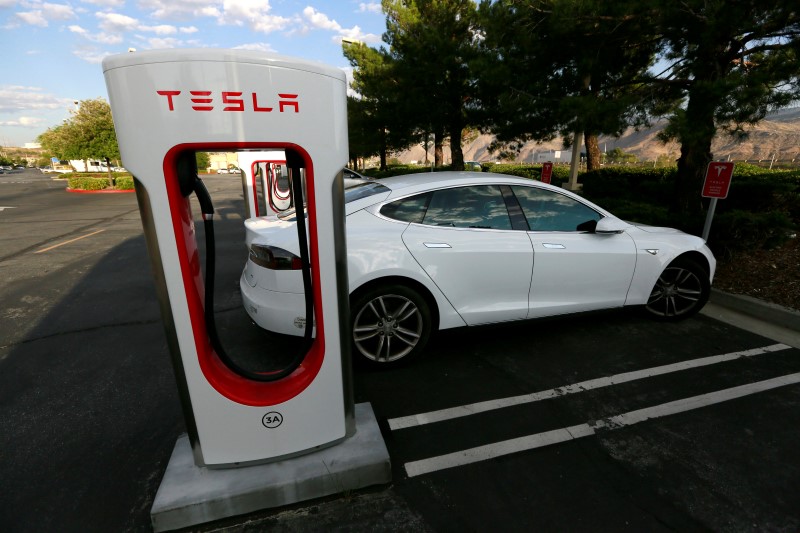SHANGHAI/BEIJING (Reuters) – Tesla CEO Elon Musk arrived in Beijing on Sunday for an unannounced visit where he was expected to discuss the rollout of Full Self-Driving (FSD) software and permission to transfer data abroad would discuss, according to a person with knowledge of the matter.
Chinese state media reported that he met Premier Li Qiang in Beijing, where Li told Musk that the development of Tesla (NASDAQ:) in China could be considered a successful example of economic and trade cooperation between the US and China.
“Honoured to meet Premier Li Qiang. We have known each other for many years now, since the early days of Shanghai,” Musk posted on social media platform X, appearing in a photo with the Prime Minister.
Tesla reached an agreement with Chinese authorities in 2018 for a factory in Shanghai, its first outside the United States.
The US electric vehicle maker rolled out FSD, the most autonomous version of its Autopilot software, four years ago but has not yet made it available in China, the world’s second-largest market, despite customer demand.
Musk said this month that Tesla may make FSD available to customers in China “very soon,” in response to a question on X.
Stock analysts at Wedbush called the surprise visit “an important moment for Tesla.”
“While the long-term valuation story at Tesla revolves around FSD and autonomous driving, a key missing piece in that puzzle is Tesla making FSD available in China, which is now on our doorstep,” Wedbush said in an emailed company report.
Remove ads
.
Rival Chinese automakers such as Xpeng (NYSE:) are trying to gain an advantage over Tesla by rolling out similar software.
Tesla has stored all data collected by its Chinese fleet in Shanghai since 2021, as required by Chinese regulators, and has not sent any data back to the United States.
Musk wants to get approval to transfer data collected in the country abroad to train algorithms for his autonomous driving technologies, the person said.
Musk’s visit to China, first reported by Reuters, was not publicly flagged and the person spoke on condition of anonymity because he was not authorized to speak to the media. Tesla did not immediately respond to a request for comment.
Chinese state broadcaster CCTV did not say in its report on Musk’s meeting with Li whether the two had discussed FSD or data.
Earlier in the day, a separate report on state radio said Li had attended the ongoing Beijing Auto Show and commented on how China’s smart new energy vehicle (NEV) sector had gained a leading position in the market and that the country had to work hard and retain its benefits.
Musk also met with Ren Hongbin, a government official who heads the China Council for the Promotion of International Trade and the organizer of the car show, state media reported.
“It’s good to see electric vehicles making progress in China. All cars will be electric in the future,” Musk said in a video posted on social media by a user affiliated with state media.
Remove ads
.
Late on Sunday, a leading Chinese auto association published a list of 76 car models it said had been tested and found compliant with China’s data security requirements, including Tesla’s Model Y and three cars.
Musk’s trip came just over a week after he scrapped a planned visit to India to meet Prime Minister Narendra Modi, citing “very heavy Tesla commitments.”
The company said this month it would lay off 10% of its global workforce as it struggles with falling sales and a growing price war for electric vehicles led by Chinese brands.
U.S. auto safety regulators said Friday they had opened an investigation into whether Tesla’s recall of more than 2 million vehicles in the United States, announced in December to install new Autopilot protections, was enough after a series of crashes.
Tesla has sold more than 1.7 million cars in China since it launched a decade ago and its Shanghai factory is the largest worldwide.
GM’S BARRA VISITED
GM CEO Mary Barra made an unannounced visit to the world’s largest auto market on Friday, according to two people with knowledge of her schedule. GM did not immediately respond to a request for comment.
Also on Friday, Grace Tao, Tesla’s vice president in charge of external relations in China, published a commentary on the social media account of state media company People’s Daily, arguing that autonomous driving technologies would be the new growth engine for the EV industry.
Remove ads
.
Tao said Tesla led research and development in autonomous driving with its “end-to-end neural network” technology and collected data from millions of cars on the road.
China’s complicated traffic conditions, with more pedestrians and cyclists than in many other markets, offer more scenarios that are crucial for training autonomous driving algorithms faster, according to industry experts.
Musk said last week that Tesla would introduce new, cheaper models using its current EV platforms and production lines and offer a new “robotaxi” with self-driving technology. He said on X this month that he would unveil the robotaxi on August 8.
Tesla shares have lost nearly a third of their value since the start of the year as concerns about the EV maker’s growth trajectory have grown. Last week, Tesla reported its first decline in quarterly sales since 2020, as the COVID-19 pandemic slowed production and deliveries.


